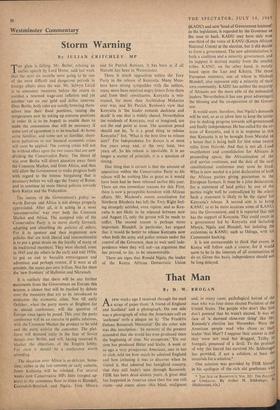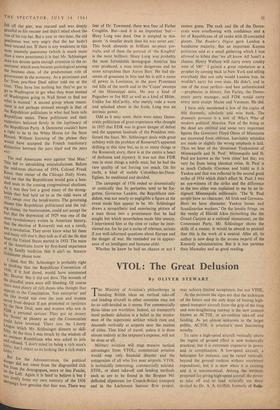That Man
By D. W. BROGAN AFEW weeks ago I received through the mail a scrap of paper from 'A friend of England and Scotland' and a photograph. On one side was a photograph of what the Americans call an `outhouse' with a plaque on it: 'The Franklin Delano Roosevelt Memorial.' On the other side was this inscription : 'In memory of the greatest scoundrel that the world has ever produced since the beginning of time. No exceptions.' Yet our time has produced Hitler and Stalin. A week or so ago a very prosperous American, met in bar or club, told me how much he admired England and how irritating it was to discover when he visited it, that admired but benighted country, that they still hadn't seen through Roosevelt. FDR has been dead sixteen years. A great deal has happened in America since then but one still meets—and meets often—this blind, malignant and, in many cases, pathological haired of the man who was four times elected President of the United States. The people who don't like hinl don't pretend that he wasn't elected. It was no case of `a damned close-run thing' like Mr. Kennedy's election last November. Were the American people mad who chose as their leader `that Man'? I suppose their answer is thel they were not mad but drugged, Trilby t° Svengali, possessed of a devil. To the problerci of why this hatred has survived Mr. Schlesinger has provided, if not a solution, at least the materials for a solution.* One solution was provided by FDR himself in his apologue of the rich old gentleman NO° * THE AGE OF ROOSEVELT, VOL. Ill: THE pou OF UPHEAVAL By Arthur M. Schlesinger, .11.' (Heinemann„ 63s.) T E SPECTATOR. JULY 14. 1961 fell off the pier, was rescued and was deeply grateful to his rescuer and didn't mind about the loss of his top hat. But a year or two later, the old gentleman was very angry that the hat hadn't been rescued too. If there is any weakness in this most masterly panorama (which is much more than a mere panorama) it is that Mr. Schlesinger does not devote quite enough attention to the re- sentment, which soon became pathological among the business class, of the predominant role of government in the economy. As a prominent and far from pro-New Deal editor told me at the time, 'They have lost nothing but they've got to V to Washington to get what they want instead of Washington going to Wall Street to find out What is wanted.' A second group whose resent- ment is not perhaps stressed enough is that of the Republican politicians in what had been safe Republican states. These politicians and their supporters believed firmly in the legitimacy of the Republican Party. A Democrat couldn't have a right to be in the White House (or the State House). Without knowing of the phrase they would have accepted the French reactionary distinction between the pays legal and the pays reel.
The real Americans were against 'that Man.' This led to astonishing miscalculations. Before the mid-term elections of 1934, Colonel Frank knox, then owner of the Chicago Daily News, told me that the Republicans would gain a hun- dred seats in the coming congressional elections. As it was they lost a good many of the strong- holds they had held on to as the tidal wave of 1932 swept over the breakwaters. The governing classes (the Republican politicians) and the rul- ing classes, the businessmen, could not accept the fact that the depression of 1929 was one of the most revolutionary events in American history, ti hat the election of Roosevelt was not a revolt, ut a revolution. They never knew what hit them Land many still don't; they talk as if all the ills that ueset the United States started in 1933. The mass of the Americans know by first-hand experience _or oldbY family tradition that it ain't so. Senator klvvater please note.
think that Mr. Schlesinger is probably right ln thinking that the Republican Convention of i236, if it had dared, would have nominated r. Hoover. But it did not dare. The wounds of ,t,ne dreadful years were still bleeding. Of course nlere were plenty of rich dupes who thought that a„PPeals to the Constitution, 'free enterprise' and sine like would win over the men and women bayed from despair if not promoted to opulence pyr,t_he New Deal, men and women who saw in f a personal saviour. They put up money 'fronts' as phoney as any the Communists Culd have invented. There was the Liberty agu Which Mr. Schlesinger dissects so skil- rtY. At the time I was struck by the wisdom of atilverninent Republican who was asked to join pn, refused. 'I don't mind its being a rich man's ' ,"nY,obby., but I object to its looking like a rich man's 6B:it for the Administration, the political C'tg_er did not come from the disgruntled rich but from the demagogues, more or less Fascist, cO..n the Left. Again it is hard to believe it but I :a.? testify from my own memory of the 1936 niPaign how genuine that fear was. There was fear of Dr. Townsend, there was fear of Father Coughlin. But—and it is an important 'but'— Huey Long was dead. One is tempted to Mis- quote. 'A timelier death than his was never any.' This book abounds in brilliant set-piece por- traits, and of these the portrait of 'the Kingfish' is the most brilliant. Huey Long was probably the most formidable demagogue America has ever produced, a man more dangerous and no more scrupulous than Aaron Burr. He had ele- ments of greatness in him and his is still a name of power in Louisiana, in the poor Protestant red hills of the north and in the 'Cajun' swamps of the Mississippi delta. He was a kind of Pugachev or Joe Hill as well as a kind of Hitler. Unlike Joe McCarthy, who merely rode a wave and splashed about in the froth, Long was an intrinsic power.
Odd as it may seem, there were many Demo- cratic politicians of great experience who thought in 1935 that FDR was in grave danger of defeat and the apparent lassitude of the President rein- forced the fears. Mr. Schlesinger deals with great subtlety with the problem of Roosevelt's apparent drifting at this time but, as in so many things in the Roosevelt story, there is at the centre a heart of darkness and mystery. It was not that FDR was in most things a subtle man, but he had the rare quality of not forcing too much. On his yacht, a kind of mobile Colombey-les-Deux- Eglises, he meditated and decided.
The campaign of 1936 ended so dramatically or comically that its peripeties tend to be for- gotten. Governor Landon, the Republican can- didate, was not nearly so negligible a figure as the event made him appear to be. Mr. Schlesinger draws a sympathetic and convincing picture of a man thrust into a prominence that he had sought but which nevertheless made him uneasy. I interviewed him at the time or rather he inter- viewed me, for he put a series of relevant, serious if not well-informed questions about Europe and the danger of war. He reminded me in appear- ance of an intelligent and humane abbe.
Whether he knew he had no chance or not I cannot guess. The rank and file of the Demo- crats were overflowing with confidence and a lot of Republicans of all ranks with ill-concealed gloom. The Reader's Digest gave Landon a handsome majority. But an important Kansas politician said at a small gathering which 1 was allowed to kibitz that 'we all know Alf hasn't a chance. Henry Wallace will carry every county west of 100°.' I gained a great reputation as a prophet by coming back to New York and telling everybody that not only would Landon lose, he wouldn't carry his own state. He didn't, and in one of the most perfect--and best authenticated —prophecies in history, Jim Farley, the Demo- cratic party manager, said FDR would carry every state except Maine and Vermont. He did.
I have only mentioned a few of the topics of this dramatic, scholarly and wise book. The dramatis persome is a sort of Who's Who of modern political America. Few of the living or the dead are omitted and some very important figures like Governor Floyd Olson of Minnesota are recovered from oblivion. Inevitably mistakes are made or slightly the wrong emphasis is laid. Thus we hear of the 'dominant Yankeedom of Minneapolis and St. Paul.' Minneapolis and St. Paul are known as the 'twin cities' but they are very far from being identical twins. St. Paul is as much Catholic (German and Irish) as it is Yankee and that was reflected in the second great strike of 1934 which didn't affect St. Paul. I was an eye-witness of the strike and the difference in the two cities was explained to me by an in- dignant Minneapolis millionaire. 'The St. Paul people have no character. All Irish and Germans. Here we have character. Yankee bosses and Scandinavian workers.' On the lunatic fringe. on the vanity of Harold Ickes (something like the Grand Canyon as a national monument), on the Communist Party, Mr. Schlesinger shows the skills of a master. It would be absurd to pretend that this is the work of a neutral. After all, its author is now deep in the arcana imperil of the Kennedy administration. But it is less partisan than Macaulay and as good reading.,



































 Previous page
Previous page